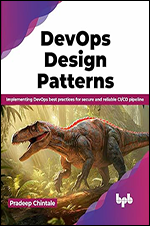The Language of DevOps: DevOps Principles & Practices
DevOps
| Beginner
- 12 videos | 1h 16m 51s
- Includes Assessment
- Earns a Badge
- PMI PDU
This 12-video course explores DevOps, a practice of managing the development and operational aspects of application development that involves engaging all stakeholders. Learners will explore the principles, processes, and tools used to adopt the DevOps culture, and its benefits. You will learn four important terms when adopting a DevOps culture, Agile, which is a project management methodology involving iterative approaches for software development, test-driven development, unit testing, and to build automation. This course also examines the benefits of adopting a DevOps culture, including production readiness, uncompromised and optimum product quality, repeatable delivery, frequent build and integration, application stack consistency, application monitoring management, and test automation. You will learn how DevOps assessment helps organizations and enterprises to measure and assess the current state of all organizational areas by analyzing the current processes and infrastructure. This course then explores the DevOps template, and how to implement the DevOps process by configuring and collaborating with various DevOps tools. Finally, you will learn how to foster a DevOps oriented organization.
WHAT YOU WILL LEARN
-
Discover the key concepts covered in this courseDefine the key principles of devopsRecognize the key devops terms, which serve as a foundation to adopting the devops cultureSpecify the critical benefits afforded by the adoption of the devops principlesDescribe the lifecycle of devops from the development and operational perspectivesList tools that can be used to manage software releases, from the development stage to the actual software release
-
Recognize the essential project management practices that are adopted to implement devops principlesDescribe the different phases involved in the devops process and the tools that can be used to facilitate devops processes and principlesDescribe devops assessment and establish the devops maturity modelIdentify the reference architectures that provide templates of proven solutions, using a set of preferred methods and capabilitiesIdentify tools that can be used to build and adopt an end-to-end devops culture and practices in the enterpriseRecall the key principles of devops, list the benefits associated with the adoption of devops principles, and specify the tools that can be used to adopt devops in the enterprise
IN THIS COURSE
-
1m 44s
-
7m 35sIn this video, you will learn how to define the key principles of DevOps. FREE ACCESS
-
3. DevOps Key Terms6m 14sAfter completing this video, you will be able to recognize the key DevOps terms, which will serve as a foundation to adopting the DevOps culture. FREE ACCESS
-
4. DevOps Benefits5m 15sAfter completing this video, you will be able to specify the critical benefits afforded by the adoption of DevOps principles. FREE ACCESS
-
5. DevOps Lifecycle7m 36sAfter completing this video, you will be able to describe the DevOps lifecycle from the development and operational perspectives. FREE ACCESS
-
6. DevOps Process Management Tools9m 8sUpon completion of this video, you will be able to list tools that can be used to manage software releases, from the development stage to the actual software release. FREE ACCESS
-
7. Project Management Practices in DevOps6m 30sUpon completion of this video, you will be able to recognize the essential project management practices that are used to implement DevOps principles. FREE ACCESS
-
8. Phases of DevOps Process and Tools5m 53sUpon completion of this video, you will be able to describe the different phases involved in the DevOps process and the tools that can facilitate DevOps processes and principles. FREE ACCESS
-
9. DevOps Assessment8m 32sUpon completion of this video, you will be able to describe DevOps assessments and establish the DevOps maturity model. FREE ACCESS
-
10. DevOps Template5m 48sFind out how to identify the reference architectures that provide templates of proven solutions, using a set of preferred methods and capabilities. FREE ACCESS
-
11. Building DevOps Culture and Selecting Tools8m 51sIn this video, learn how to identify tools that can help you build and adopt an end-to-end DevOps culture and practices in your enterprise. FREE ACCESS
-
12. Exercise: DevOps Principles and Lifecycle3m 46sUpon completion of this video, you will be able to recall the key principles of DevOps, list the benefits associated with the adoption of DevOps principles, and specify the tools that can be used to adopt DevOps in the enterprise. FREE ACCESS
EARN A DIGITAL BADGE WHEN YOU COMPLETE THIS COURSE
Skillsoft is providing you the opportunity to earn a digital badge upon successful completion on some of our courses, which can be shared on any social network or business platform.
Digital badges are yours to keep, forever.






